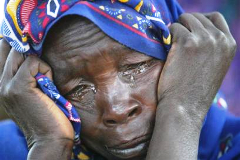Sudanese govt, opposition alliance to work together to end Darfur conflict
CAIRO, Egypt, Jan 18, 2005 (AP) — Sudanese officials and opposition groups said Monday they will work together to try end the nearly 2-year-old conflict in African country’s western Darfur region.

|
|
A Sudanese refugee cries upon reaching Bahai on the Chad border, after fleeing political violence in Darfur, Sudan, July 9, 2004 (AP). |
The call to resolve the conflict, which has killed an estimated 70,000 people and displaced about 2 million from their homes, follows Sunday’s reconcilliation deal between the government and an umbrella opposition movement, the National Democratic Alliance, plus a separate peace treaty that ended the 21-year southern civil war.
Recent political developments, particularly the Jan. 9 southern peace deal between the Khartoum-based government and the Sudan People’s Liberation Army, have raised hopes that a similar solution can be found to end the Darfur violence.
The NDA, headquartered in Eritrea, and the Sudanese government initialled a reconciliation deal in the Egyptian capital, Cairo, that supports the southern peace agreement, backs the drafting of a new constitution and calls for the formation of a neutral, professional army.
The agreement, which will be finalized Feb. 12, also said the parties would support a November cease-fire deal brokered by the African Union in Nigeria between Sudan’s government and Darfur’s two main non-Arab rebel groups.
Darfur’s rebels launched attacks against Sudanese forces in February 2003 over demands for greater regional autonomy and a larger share of wealth and resources. Sudan’s Arab-dominated government and pro-government Arab tribal militia, known as Janjaweed, is accused of attacking non-Arab villages in Darfur. Sudan denies targeting civilians or allying with the Janjaweed.
“Both sides will work to support peace efforts in Abuja, Nigeria, under the African Union to solve the dispute in Darfur and confirmed their backing for decisions made to stop the bloodshed in the region and to achieve the legitimate aspirations of its people,” the NDA-Sudan agreement said.
In New York, U.N. Secretary-General Kofi Annan said he was unsure whether the southern peace treaty has had any impact on resolving the Darfur crisis.
“We have always argued that an agreement between the North and the South could facilitate the Darfur agreement since the issues of governance, revenue sharing, had been dealt with in the North-South agreement,” Annan said.
“The (Sudanese) government had indicated that they were prepared to put those issues on the table, but I cannot say now how quickly we could move.”
U.S. officials, particularly Washington’s U.N. ambassador John Danforth, have urged Sudanese officials to enlist SPLA leader John Garang, who becomes a first vice president under the southern deal, to help negotiate an end to the Darfur conflict.
The NDA, which comprises numerous armed and political groups, was formed in 1989 in response to the coup that saw Sudanese President Omar el-Bashir seize power from Sudan’s last democratically elected prime minister, Sadiq el-Mahdi.
During the past 16 years, armed NDA members have fought alongside the SPLA in the southern civil war, which left 2 million people dead, and launched sabotage attacks and other low-level violence in Sudan’s north and east in opposition to el-Bashir’s Islamic-oriented government.
Sunday’s reconciliation deal also established a joint committee to start work Feb. 1 on calls to disarm the NDA’s armed militias.
